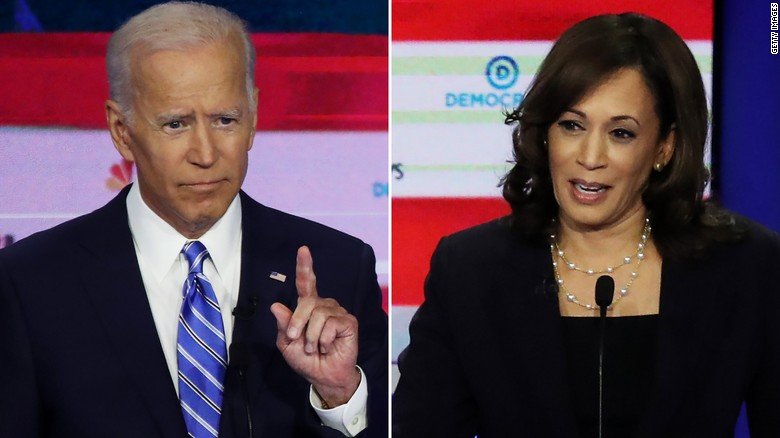Joe Biden selects California Sen. Kamala Harris as his running mate

WASHINGTON, DC -- Former Vice President Joe Biden named his former campaign trail rival, Sen. Kamala Harris, D-Calif., as his running mate on Tuesday.
She will appear with Biden for the first time as his running mate at an event Wednesday near his home in Wilmington, Delaware.
In announcing the pick, Biden called Harris a “fearless fighter for the little guy, and one of the country’s finest public servants.” She said Biden would “unify the American people” and “build an America that lives up to our ideals.”
Harris joins Biden at a moment of unprecedented national crisis. The coronavirus pandemic has claimed the lives of more than 160,000 people in the U.S., far more than the toll experienced in other countries. Business closures and disruptions resulting from the pandemic have caused severe economic problems. Unrest, meanwhile, has emerged across the country as Americans protest racism and police brutality.
As the vice presidential search wore on against the backdrop of racial tensions and social change, Biden was frequently questioned about whether he would choose a woman of color as his running mate.
By choosing Harris, who is black and Indian American, Democrats are sending a powerful and historic statement ahead of the November election as the nation continues to grapple with social change. If elected, Harris would not only be the first woman to serve as vice president, but would also be the first Black woman to be second in command and the highest-elected Asian American in history.
The junior senator from California has already achieved a number of historic milestones as the second African American woman and first South Asian American senator in history. She was also the first African American and first woman to serve as California's attorney general. Her friendship with a fellow attorney general, the late-Beau Biden, remains a bond between Harris and the Bidens.
In the U.S. Senate, Harris serves on the Homeland Security and Governmental Affairs Committee, the Select Committee on Intelligence, the Committee on the Judiciary and the Committee on the Budget. Her tough questioning of Supreme Court Justice Brett Kavanaugh was one of the instances that increased Harris’ popularity among Democrats on a national level.
In recent months, Harris advocated for legislative policies aiming to alleviate the aftershocks millions of Americans felt in the wake of the coronavirus. She also drew on her experiences as a woman of color to call for change in the aftermath of George Floyd’s death. Recently, Harris, along with her colleague and former presidential campaign trail rival, Sen. Cory Booker, gave emotional arguments in favor of making lynching a federal crime. The pair, along with other high-profile Democrats, also introduced legislation to make Juneteenth a national holiday.
During the Democratic primary campaign, Harris -- the sole Black woman in the running -- was amplified as a top contender following a debate performance in which she took Biden to task over his past stances on busing policies.
"There was a little girl in California who was part of the second class to integrate her public schools and she was bused to school every day. That little girl was me," Harris said at the time.
Following the debate, Biden complimented Harris.
"She is a first-rate intellect, a first-rate candidate and a real competitor," he told reporters at an event in Iowa last year. "I have mixed emotions about it because she is really a solid, solid person and loaded with talent. I’m sure she’s not dropping out on wanting to make the changes she cares about.”
Harris suspended her presidential campaign in early December, and endorsed Biden after his Super Tuesday sweep.
She served as a top surrogate for the Biden campaign amid the pandemic landscape and was one of his top fundraisers. With traditional campaign events severely limited due to safety concerns, Harris participated in a variety of virtual events to back Biden, including roundtable discussions, state-specific appearances and even a virtual concert fundraiser featuring high-profile DJs.
Harris’ entry to the presidential campaign is likely to see criticism from some social activists who do not feel that she could serve as an agent of change for policing reform given her past record as a prosecutor, a notion Harris adamantly pushes back against.
"This is simply wrong, it's just absolutely wrong. When I was attorney general of California, I instituted one of the first requirements that law enforcement officers receive training on racial implied bias and procedural justice," Harris said during a cable news interview in June.
"I'm the first that created a whole division and approach, that actually became a national model," she added.

